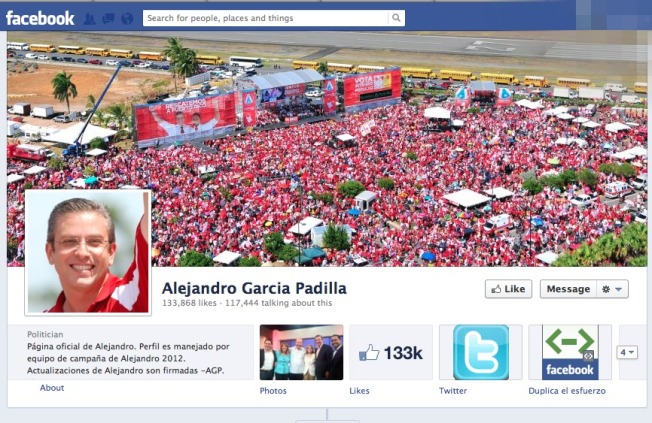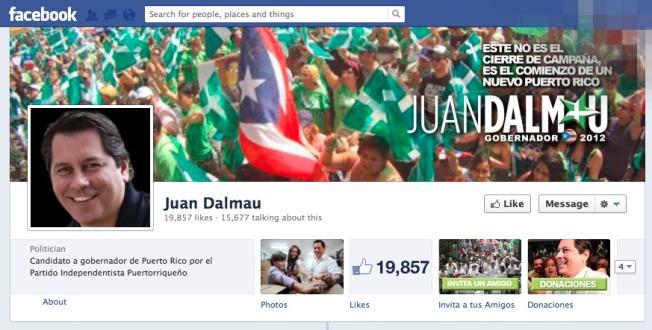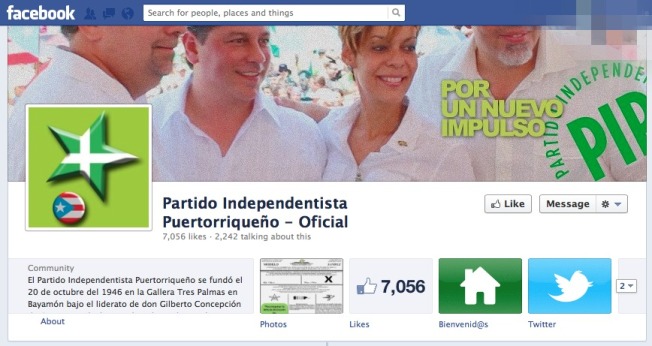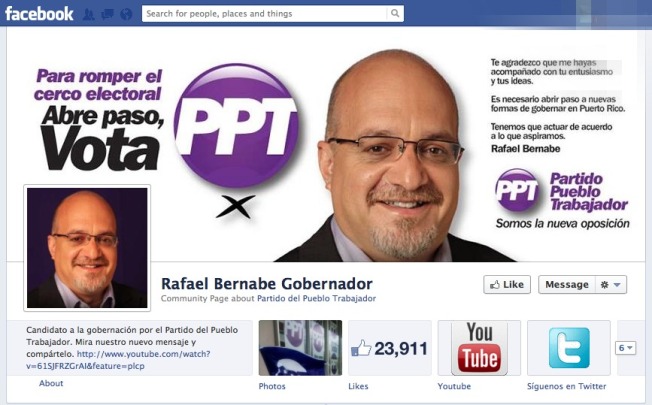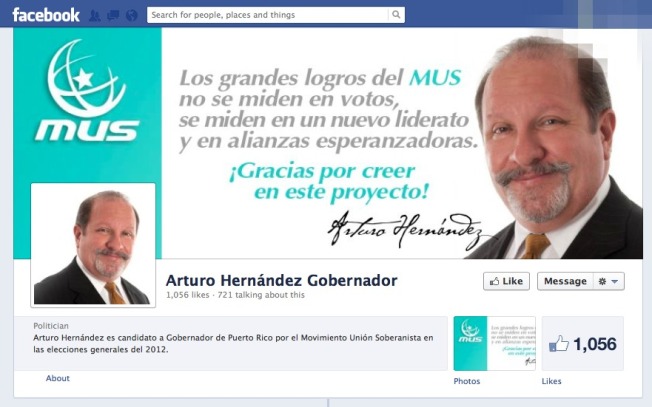Political Parties & their use of Social Medias
Disclaimer: This post has no affiliation with any of the political parties presented below.
2012! The year that will determine big changes, no matter where you are or from where you are from, the elections is the main topic everywhere we go, specially here in Puerto Rico. This year new political parties have been incorporated and these are: Movimiento Unión Soberanista (MUS), and Partido del Pueblo Trabajador (PPT).
Apart from these two parties there are four more and these are: Partido Independentista Puertorriqueño (PIP), Partido Popular Democtrático (PPD), Partido Nuevo Progresista (PNP), and Partido Puertorriqueños por Puerto Rico (PPR).
These parties have been preparing for the big day, November 6th.
But, how have they done this?
Most of them have chosen the traditional way of communications, choosing television, radio, and the newspapers. However, they have also kept in mind how the social networks and the internet are being an important part of every person’s life. Taking this in consideration here is an analysis of the use of the social medias through the different political parties:
Partido Nuevo Progresista (PNP)
With his own Facebook page Luis Fortuño the candidate for governor of Puerto Rico he has opened the opportunity of all Facebook users to follow him and the Political Party PNP.
Keeping Facebook in mind, this past Saturday was his campaign closure ceremony and what better way to close a campaign than being part of face of Facebook for the whole day. Here is the ad that was published on the sign in page for Facebook:
This is not all, apart from these banners on multiple pages of the Internet have been published promoting his campaign.
Twitter is the next social media that has been used the most for his and the political party campaign. Documenting the different places he will be at, what he is doing, where he is going and how he feels towards the coming of the day of elections:
Here is a video of the official website of the PNP political party:
Partido Popular Democtrático (PPD)
With his own Facebook page Alejandro Garcia Padilla the candidate for governor of Puerto Rico he has opened the opportunity of all Facebook users to follow him and the Political Party PPD. Using Facebook as their main way to communicate, they share through this social media all their opinions towards the things that are happening, where are they going and how he feels towards the coming of the elections.
Here is a video of the official website of the PPD political party:
Twitter is another source that the PPD party has used to communicate with the people and have given the opportunity to the people to communicate with them. The page of Alejandro Garcia Padilla has a specific icon with the purpose that people write to him and share their opinion and receive an answer from Alejandro. Here are the pictures of the respective party and candidate:
Partido Independentista Puertorriqueño (PIP)
With his own Facebook page Juan Dalmau the candidate for governor of Puerto Rico he has opened the opportunity of all Facebook users to follow him and the Political Party PIP. Here are their respective profiles:
Sharing the same specified icon where people can contribute to the tweet page of Dalmau, he has been maintaining the tradition of re-tweeting those messages that are sent to him. Here is an image of their twitter profiles:
Here is a video of the PIP’s official website:
Partido Puertorriqueños por Puerto Rico (PPR)
Facebook has been a mayor tool for the PPR party specially in sharing the activities and where has their candidate Rogelio Figueroa been.
Twitter as for the other parties was another tool used to keep in contact with their followers and their comments towards what was happening here in Puerto Rico:
Here is the video of the official website for the political party PPR:
Partido del Pueblo Trabajador (PPT)
This political party has been introduced this year and have used the social medias and Internet with the purpose that people get to know who they are, what’s their objectives and how they plan to make a better Puerto Rico. The candidate for governor is Rafael Bernabe, for the political party PPT.
Letting people know them and recognize their new political party they also created a youtube page where they would upload all the different ads created for their campaign.
Their twitter page as the other political parties holds the same purpose of communicating with the audience in a more “personal” way where the answers are more faster and to the point. However, here you will see a snapshot of the main part of their profile in twitter and compared to the rest of the parties you can see that they haven’t taken the time in personalizing it, specially in the background.
Here is the video for the official website of the political party PPT
Movimiento Unión Soberanista (MUS)
This political party has also been introduced this year and with a combination of Facebook, Twitter, Ustream and their own website they have taken their message through the different social medias with the purpose of letting people introduce themselves with this brand new political party. The MUS party has Arturo Hernandez as their candidate for governor. Here are their main pages of Facebook:
Their Twitter page is the following, here you can appreciate the tweet the MUS column where people can share their opinions or ideas with the political party. Allowing the people and the party have a communication where they can answer the people’s questions, etc.
Here is the video of the official website of the MUS political party:
In conclusion, to my analysis dedicated on the use of the social networks and Internet in the different political parties of 2012 elections of Puerto Rico. I have decided that the political party that employed these tools in the most positive way was the Partido Nuevo Progresista (PNP). I have seen how the advertising campaign for this party is one that has reached all the major as well as minimum websites and social networks of the Internet. In my opinion they have made a great effort of delivering their message through the variety of websites that contain their advertisings.





